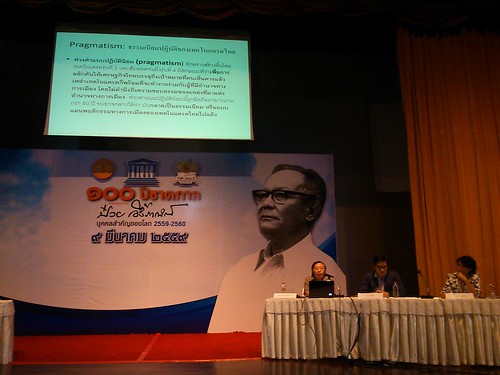An education expert pointed out that despite attempts to implement democratic principles in school lessons, Thai education fail to create active citizens in the democratic system of governance.
On Wednesday, 9 March 2016, Thammasat University, Tha Prachan Campus, organised an event for the centennial anniversary of Puey Ungphakorn, a late former rector of Thammasat and governor of the Central Bank of Thailand, renowned for his role in the development of Thai politics and economy.
Referred to by many as an ‘incorruptible’ statesman, Puey who was forced into a self-imposed exile in the UK after the 6 October 1976 student massacre shortly after he resigned from his post as Thammasat rector in protest of the bloodbath.
At the event, the country’s leading academics launched a book titled ‘Puey and the Thai Society in Transition’ in which they wrote about the legacies of Puey and their critics on his roles in relation to human rights, democracy, economy, and education in Thailand.
Putting the legacy of Puay on Thailand’s education in perspective, Vachararutai Boontinand, an expert from the Institute of Human Rights and Peace Studies of Mahidol University, who authored a chapter in the book titled ‘Education and the Creation of Democratic Citizenship: Development and Challenges of Thailand’, pointed out that regardless of attempts to device democratic principles in school pedagogies, the country has failed to create active democratic citizenship.

A discussion at Thammasat University, Tha Prachan Campus, on 9 March 2016, at the centennial anniversary of Puey Ungphakorn
Vachararutai pointed out that, in theory, the major reason for a state to provide public education is to foster the sense of citizenship in order to serve the purpose of the nation state. Therefore, civic duty or citizenship classes are implemented in various countries.
There are many theories on the creation of democratic citizenship, but it is still a widely debatable concept as to what sort of characters should active democratic citizens have, said the education expert.
Talking about Puey and education at the forum, she said “Puey’s thoughts on [democratic] citizenship can be divided into two major categories, which are participative citizens who have rights and liberties and citizens who also possess responsibility and moral principles, which are all connected with democracy and justice.”
As for the case of Thailand, through her studies of the pedagogies of civil education lessons at the primary and secondary level of Thai public education implemented in different periods, Vachararutai concluded that Thai education always heavily focuses on how to created ‘good persons’, stressing on the quality of being good, disciplined, docile, loyal, united, and possessing high morale.
When the pedagogies were revised and changed in 2001 and 2008, concepts such as participation of citizens, respect of the rule of law, and conflicts in the society were added in the pedagogies. Nonetheless, at the same time, the same pedagogies also emphasise on Thai cultures and traditions, such as respect towards elders or one role and duties of individuals based on their occupations and family lineage, Vachararutai analysed.
“It seems that there are two contradictory themes of the pedagogies one of which is the international principles of [democratic citizen] and the Thai one stressing on cultures and traditions,” said the education expert.
She said that on her studies of a school which was rewarded by the National Identity Commission three times as a model school for promoting democracy, there is a student council whose members are elected by their fellow students. However, the student council is not given opportunities to participate in the school affairs, but only to become eyes and ears of their teachers.
As for alternative Thai schools, although student might have more freedom to interact with teachers, but seniority and hierarchy are still adhered to by students generally.
Discussing about tertiary level of education, Vachararutai said that there are no mandatory civic duty or citizenship classes. However, in recent decade, certain universities, such as Thammasat University implemented a class on the topic as general education, for example, TU100 class which was opened in 2011.
These tertiary level classes are successful in creating active democratic citizens to a certain extend. However, the learning dimensions are mostly confined to the individual level rather than providing constructive tools for students to understand underlying structural problems of societies.
In order to create more active democratic citizens as the Thai society and it socio-economic structures get more complex and unequal, Vachararutai urged at the forum that the Thai education system especially at the primary and secondary level should provide analytical tools for the youth understand root problems of the country’s politics and economy in order to foster a more just society.















